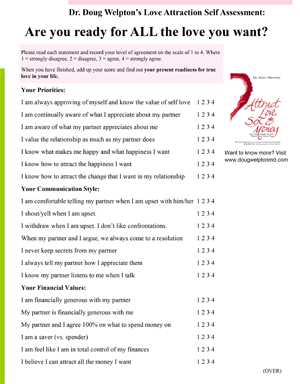Scott started our meeting. “I think I’ve found a solution to Karen’s feeling unequal,” he said with excitement.
“What do you have in mind?” I inquired.
“It’s a surprise,” Scott answered. “I wanted to share it with you right here,” he said as he turned toward Karen.
“What are you talking about?” she asked.
“I realized recently that no matter how long you work at your job because of your pay scale you will never be able to save very much for your retirement,” Scott said. “I decided to give you a gift that would make us equal. I split my retirement savings. I put half my account in a new account under your name. It’s yours to do with as you please. It means you are financially independent. You aren’t forced to be married to me because of money.”
“How do you feel about this?” I asked Karen.
“You have surprised me!” she said looking at Scott. “I know how hard you’ve worked to create your company and to save for our retirement. I feel deeply touched that you would split equally what you have put away.”
Scott smiled. “I hope it can solve our equality issue,” he said.
“Not really,” Karen responded. “It doesn’t make me feel equal. In fact, my awareness that I could never earn and put away what you are giving me makes me feel less equal. It’s like what I see with the people I counsel on disability. The money they get from the government helps them take care of their needs, but it doesn’t make them feel better about themselves. Most the people I see on welfare feel less good about themselves.”
“Well I didn’t intend to make you feel worse about yourself,” Scott said. “I wanted you to know how much you mean to me. I gave you the gift to express my love and gratitude to you as my wife of twenty-two years. Your support has helped me earn what I’ve saved.”
“I know you intended to help Karen through your gift,” I said. “Like many gifts, however, it has unintended consequences that you might not have anticipated in your eagerness to help Karen.”
“I know you meant to help me,” Karen responded. “The money does help me feel secure about the future and being taken care of. But having the same amount of money you have doesn’t make me feel equal.”
“What can I do then,” Scott asked, “to help you feel like we’re equals?”
“You’ve already done it,” Karen replied, “when you accepted my offer to take charge of our finances. By agreeing to my managing our finances you gave me the opportunity to show how I can help.” She paused. “Equality isn’t about money or power,” she continued. “It’s about how we see ourselves and how we feel inside.”
“Is there anything more Scott can do to help you with that?” I asked Karen.
“Scott doesn’t need to rescue me!” she answered. “I am not a victim.” Her tone was firm. “Even though I grew up through some abusive experiences with drinking in my family I have chosen not to see myself as a victim. When I used to feel like a victim I got sympathy from my friends but the price of remaining stuck and not feeling good about myself was very high. Blaming others kept me from taking responsibility and making the best of my abilities. I saw friends of mine get stuck in victimhood and I didn’t respect them. What helped me grow was taking opportunities, like I’m now doing managing our finances. I am demonstrating what I can do. I respect myself by doing the job well and Scott might appreciate me too.”
“Are you saying that your own self-respect comes first?” I asked Karen.
“Absolutely,” she answered. “My self-evaluation has to come first. I don’t want to depend on someone else to make me feel good. It is helpful, at the same time, when Scott honestly validates me for the good job I’m doing. His caring for me and treating me with respect, which he is now doing, is how he helps me.” Following a short pause, she added: “His feeling good about himself also helps because I see him respect himself and that inspires me to value myself.”
“I learned to be a rescuer growing up,” Scott responded. “Like Karen I, too, grew up in a family with alcohol problems. I learned to rescue members of my family. I got praise from other people, but it caused me to neglect myself. I became needless and want-less. I didn’t learn how to be clear about what I needed and wanted. As a consequence I became resentful. That’s been a cause of my resentment with you when I didn’t feel like you were doing your share,” he said to Karen.
“When you are being the rescuer and over-functioning it’s easy to become a scorekeeper,” I said. “You keep track of what your partner does compared to what you do. Scorekeeping is toxic to a marriage. It bases marriage on competition rather than on cooperation.”
“I’ve been a scorekeeper in comparing what Karen does with what I do,” Scott said. “I see that it’s been bad for our marriage.”
“I was an habitual scorekeeper,” I said. “My wife and I loved to go to the movies but we preferred different movies. We agreed to trade off whose movie we saw. When we watched one of her movies I used to insist that we go to my movie the very next time. I felt cheated if we didn’t.”
“What changed it?” Karen asked.
“I realized there was a third presence in our marriage,” I explained. “ I started out believing there was just my wife and me. When someone asked me how important our relationship was to me I woke up. I saw that our relationship was very important to me. I wanted to nurture our relationship to make it grow. That’s when I awakened to doing what is good for our relationship. When I went to my wife’s preferred movie several times in a row I felt good about nurturing our relationship. I stopped keeping score.”
“When I realized just recently that my scorekeeping was hurting our marriage,” Scott said, “I started working on giving it up. I learned that what works best for me is to do the things I see that need doing regardless of what Karen has done. When she sees what I have done she is likewise inspired to do what she sees that needs doing. It generally evens out, and even if it doesn’t, I still can appreciate what I have done for our welfare and feel good about that.”
“I know there were times when you were score-keeping,” Karen responded, “and I felt your resentment. It felt like you saw yourself as superior and I resented it. I wanted to bring you down. Sometimes I made critical remarks that I knew would hurt you. I’m sure that played a part in our stopping talking. I learned that I felt worse about myself as a consequence of my getting back at you.”
“It is a mistake to try to get equal by bringing someone else down,” I said. “It doesn’t work because you bring yourself down too. The goal of life is not to win; the goal to grow and share. We get equal by lifting ourselves up and helping others lift themselves. When we want for others what we want for ourselves and act accordingly,” I said, “everyone rises.”
“In keeping with that spirit,” Karen said looking at Scott, “what I would appreciate is your putting back into your retirement account the money you gave me, and for you to continue to manage it. In my work I have witnessed too many unintended consequences from trying to make people equal. To administer equality requires a vast government and everyone loses their freedom—-those who are taxed as well as those who receive the distributions as they grow more dependent.”
“Would it feel easier for you to be giving to Karen through the government?” I asked Scott.
“Not at all,” he replied. “It would feel totally impersonal. My giving to Karen was personal, which is what made it special. And I was choosing to do it which made it generous. Paying taxes feels like charity through intimidation—if you refuse you are fined or put in prison.”
“Is there something else Scott might do that would help?” I asked Karen.
“Yes,” she responded. “We need to create a good estate plan together.”
Turning to Scott she continued: “You could find a good estate lawyer for us to draw up our wills and create a trust. With the lawyer’s help we can plan for how to best deal with the illness or death of either of us, how to take care of whoever survives, and how to care for our children and their children.”
“I like the way we are coming together,” Scott said to Karen, “and especially how I see you as a partner who respects herself and is helping us create a stronger family.”
“There is one more idea I have,” Karen said to Scott. “I have been talking with my best friend who is urging me to come back to church. Now that I have more time with the children gone I would like to be involved with our church community. People there have been very supportive of us. I would love to have you join me. I believe it would be good for us and would allow us to help others,” Karen said.
“I think it’s a good idea,” Scott said. “It would be good for our marriage at a time when there isn’t much support for marriages in our society. During the last forty years most people don’t realize the marriage rate in our country has dropped dramatically.”
“You’re right,” Karen said, “and more than four out of every ten children are now born out of wedlock. What’s more, fewer people, and especially those under the age of forty, are part of a church community. ”
“If we want the church to be here when our grandchildren are born it sounds like we need to get involved,” Scott responded.
Scott and Karen left my office holding hands.
Is Equality Important in Your Marriage? Part 3
Download Dr. Welpton’s Audio Collection
Audios
CD1: Financial Infidelity & Money
CD2: Is my Partner the Right Person for Me?
CD3: To Stay or Not to Stay: Considerations before Divorcing
CD4: Stop Arguing for the Sake of Your Relationship


